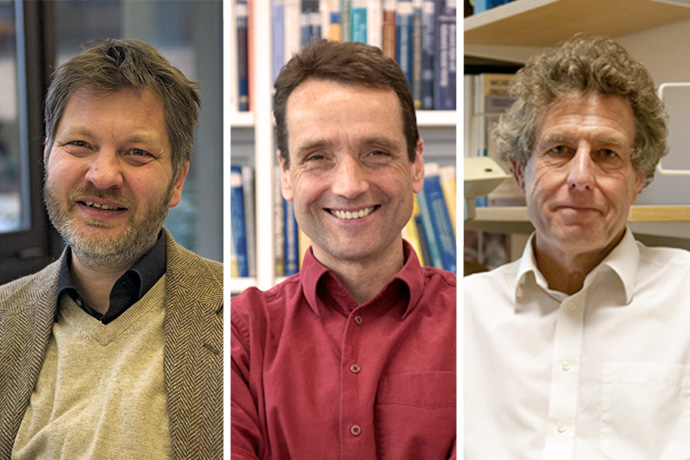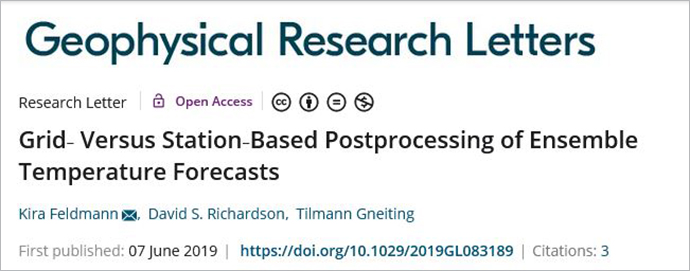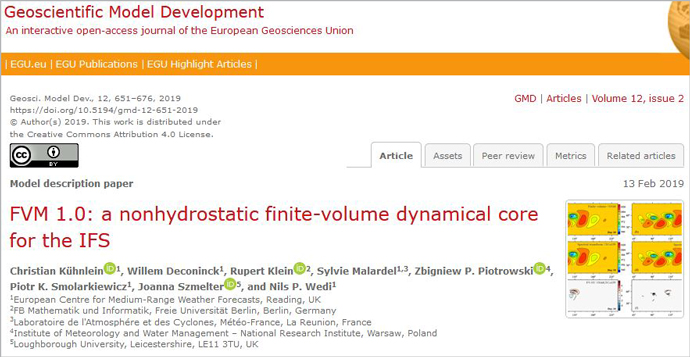

Left to right: Professor Tilmann Gneiting (Heidelberg Institute for Theoretical Studies (HITS) and Karlsruhe Institute of Technology (KIT)), Professor Rupert Klein (Freie Universität Berlin) and Professor Tim Palmer (University of Oxford).
The fellowship terms for ECMWF’s first three Fellows have now come to an end. Professor Tilmann Gneiting (Heidelberg Institute for Theoretical Studies (HITS) and Karlsruhe Institute of Technology (KIT)), Professor Rupert Klein (Freie Universität Berlin) and Professor Tim Palmer (University of Oxford) were appointed in July 2014 when the fellowship scheme was launched.
The partnerships have strengthened links between ECMWF and the Fellows and their wider research groups in several areas, including the calibration and post-processing of forecasts; novel numerical methods; the use of ‘single precision’ in ECMWF’s Integrated Forecasting System (IFS); predictability; and machine learning.
The summaries below highlight some of the progress achieved.
Work on the calibration and post-processing of forecasts with Prof. Tilmann Gneiting
Tilmann Gneiting leads the Computational Statistics Group at Heidelberg Institute for Theoretical Studies (HITS) and is Professor of Computational Statistics at Karlsruhe Institute of Technology (KIT) in Germany. He is a mathematical statistician with a strong interest in verification and statistical post-processing for ensembles and probabilistic forecasting.
Joint work with Prof. Gneiting and members of his Computational Statistics Group at HITS has demonstrated the benefits of using state-of-the-art calibration for ECMWF forecasts. By treating the complete set of ECMWF forecasts (high-resolution, control and perturbed ensemble members) as one forecasting system, with appropriate weight to each component, post-processing can substantially improve probabilistic forecasts (see ECMWF Newsletter No. 142, Calibration of ECMWF forecasts). The collaboration has also explored post-processing methodologies that can maintain spatial consistency and investigated the differences between verification against observations and against analyses.
ECMWF has benefited from the statistical expertise of Prof. Gneiting and his group in a number of verification, post-processing and diagnostic activities, including during several visits to ECMWF by Prof. Gneiting and his team. This has included participation in several workshops, with keynote presentations by Prof. Gneiting on both verification and statistical post-processing methods.
ECMWF’s association with Prof. Gneiting has also led to new collaborations, for example with Dr Sándor Baran (Debrecen University, Hungary) on methodologies to evaluate mixed-resolution ensembles.

In a joint paper Grid‐ Versus Station‐Based Postprocessing of Ensemble Temperature Forecasts published in Geophysical Research Letters, Kira Feldmann, Tilmann Gneiting (both HITS) and David Richardson (ECMWF) found that statistical post-processing yields improved temperature forecasts at lead times from a single day to more than two weeks ahead. Other papers co-authored by members of Prof. Gneiting’s research groups and ECMWF staff include Discrete Postprocessing of Total Cloud Cover Ensemble Forecasts (Monthly Weather Review) and Trends in the predictive performance of raw ensemble weather forecasts (Geophysical Research Letters).
Work on numerical methods with Prof. Rupert Klein
Prof. Rupert Klein is an applied mathematician with a long-standing research track record in theoretical and computational fluid dynamics, in the field of both meteorology and engineering.
As an ECMWF Fellow, Prof. Klein has collaborated through contributions of individual technical advances, by steering and inspiring topics of research proposals and by facilitating the dissemination of ideas conceived at ECMWF.
In particular, Prof. Klein provided complementary views and experience in novel numerical techniques and helped to substantiate the formulation of the Finite-Volume Module of the Integrated Forecasting System (IFS-FVM) and its efficiency.

Work on the IFS-FVM led to a joint publication in the journal Geoscientific Model Development (GMD) on the development of a nonhydrostatic finite-volume dynamical core for the IFS.
Developing an alternative dynamical core option for ECMWF and its Member States and gaining experience and knowledge in entirely different numerical methods are important to ensure the scalability of ECMWF’s Earth system model.
Prof Klein’s fundamental work on scale regimes for atmospheric flows provided a theoretical background for the development of alternative model dynamical core options and also led him to investigate data assimilation and model initialisation for non-hydrostatic models. This work led to a deep reflection on the equations used in numerical weather prediction and ECMWF’s IFS in particular. It was followed-up with a recent paper co-authored by researchers from Météo-France and ECMWF entitled Semi‐implicit integration of the unified equations in a mass‐based coordinate: model formulation and numerical testing in the Quarterly Journal of the Royal Meteorological Society.
Prof. Klein provided ECMWF researchers with information about novel developments in applied-mathematics academia, reviewed ECMWF research directions and directly involved ECMWF researchers in international workshops with a mathematical focus. He also served as an external reviewer of the Horizon 2020 scalability project ESCAPE.
Work on single-precision forecasts, predictability and machine learning with Prof. Tim Palmer
Professor Tim Palmer FRS CBE is a Royal Society Research Professor at the University of Oxford. He has spent most of his career working on the dynamics and predictability of weather and climate, including 25 years at ECMWF. He has pioneered the development of probabilistic ensemble prediction systems and the concept of stochastic parametrization schemes, an ingredient which is indispensable for forecasts at ECMWF today.
As an ECMWF Fellow, Prof. Palmer has provided essential contributions to many aspects of research at ECMWF. The most prominent example is the strong collaboration on the use of reduced numerical precision within weather forecast simulations. The work on the single-precision version of the IFS – which will soon be implemented in operational predictions – was pioneered by Prof. Palmer’s research group in Oxford and supported during the entire development process by joint research studies.

A paper in the Monthly Weather Review, co-authored by ECMWF researchers and Prof. Tim Palmer, looked at Single precision in weather forecasting models: An evaluation with the IFS. Other recent joint papers on the subject include Reduced‐precision parametrization: lessons from an intermediate‐complexity atmospheric model (Quarterly Journal of the Royal Meteorological Society).
Collaboration during the Fellowship has also stimulated several research projects on the use of machine learning in numerical weather prediction.
The use of probabilistic forecasts for real-life applications and the role of reliability in ensemble weather and climate forecasts have continued to be at the heart of Prof Palmer’s research on predictability. More recently this has also included multi-decadal variability of teleconnections and their forecast skill as well as the attribution of extreme events in a forecast-based approach. Developing stochastic parametrizations for the atmosphere, the ocean, sea ice and the land surface is another focus of Prof Palmer’s ongoing research of direct relevance to ECMWF.
As an ECMWF Fellow, Prof. Palmer has also been instrumental for the ExtremeEarth initiative, which aims to develop global, storm-resolving simulations that can be run at sufficient speed on future, heterogeneous supercomputers to allow for use in operational weather and climate predictions.
Continuing cooperation
ECMWF Director-General Florence Rabier praised the dedication of the outgoing Fellows: “ECMWF is grateful to Tilmann, Rupert and Tim for their impressive contributions and tremendous engagement during their Fellowships,” she said. “The Centre has benefited greatly from their expertise and we look forward to continued collaboration in the future.”
Such partnerships offer opportunities for in-depth discussion and joint research not only with individual Fellows, but also with their wider research networks. Since the start of the scheme, some members of research groups associated with ECMWF Fellows have gone on to take up positions at ECMWF.
In the six years since the first Fellows were appointed, a further five scientists have become part of ECMWF’s Fellowship programme: Professor Daniel Jacob, Professor Heini Wernli, Professor Marc Bocquet, Dr Louise Nuijens, and Dr Maria-Helena Ramos.
